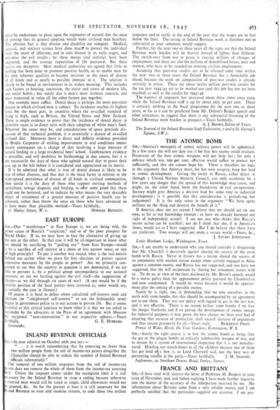INLAND REVENUE OFFICIALS
x,—In your editorial on October 26th you say:— " . . it is worth remembering that by removing no fewer than two million people from the roll of income-tax payers altogether the Chancellor should be able to reduce the number of Inland Revenue officials substantially."
The removal of two million taxpayers from the roll of income-tax vers does not remove the whole of them from the income-tax assessing Id. Unless the taxpayer comes under the exemption limit it is still
ecessary for the Inland Revenue to issue a coding because otherwise married man would still be taxed as single, child allowances would not granted, &c. So for the present at least it is still necessary for the niand Revenue to issue and examine returns, to code those two million taxpayers and to verify at the end of the year that the wages are in fact below the limit. The saving in Inland Revenue work is therefore not so substantial as your comment would suggest.
Further, for the next two or three years all the signs are that the Inland Revenue work burden will be heavier instead of lighter than hitherto. The switch-over from war to peace is causing millions of changes of employment and there are also the millions of demobilised forces, men and women, who have to be recoded on entering civilian employment.
Assuming that post-war credits are to be released some time within the next two or three years the Inland Revenue has a formidable job ahead, because the work on computation of post-war credits is already seriously in arrear. There are about twelve million post-war credits for the tax year 1944/45 yet to be worked out (and this job has not yet been touched) as well as the credits for 1945/46.
The number of taxpayers has increased about three times since 1939, while the Inland Revenue staff is up by about only 50 per cent. There is certainly nothing in the fiscal programme for the next two or three years, so far as it can be predicted from Mr. Dalton's Budget speech and other utterances, to suggest that there is any substantial lessening of the Inland Revenue work burden in prospect.—Yours faithfully,
A. J. BROWN, Editor of Taxes. The lournal of the Inland Revenue Staff Federation, 7 and 9 St. George's Square, S.W.!.






























 Previous page
Previous page